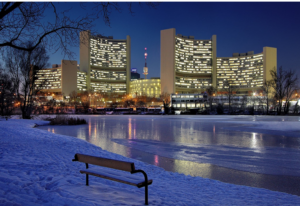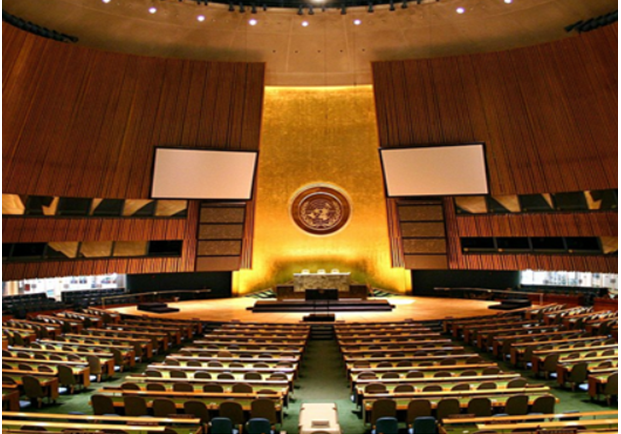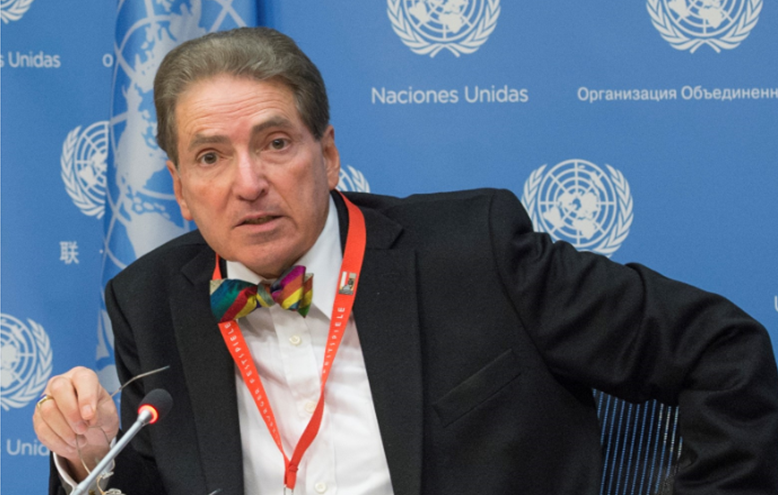By ALFRED DE ZAYAS | The world has fundamentally changed since 1945. The power equation that was valid in the wake of World War II has shifted, giving way to an emerging multipolar world order reflecting the growing importance of the rapidly “developing” countries.
New geopolitical groupings like BRICS[1] – initially comprising Brazil, Russia, India, China and South Africa – challenge the hegemony of the G7 bloc of leading advanced economies. Nineteen countries have expressed interest in joining BRICS[2], including Algeria, Argentina, Egypt, Mexico, Nigeria, Saudi Arabia and United Arab Emirates[3]. Among developments, a BRICS currency is underway, which will accelerate de-dollarization of international trade[4].
As the new “Global Majority” becomes aware of its economic and political power, a new modus vivendi with the “collective West” must be crafted. The United Nations is an appropriate forum to help shape this structure of peaceful coexistence based on the values of the UN Charter and the Universal Declaration of Human Rights.
Should UN headquarters move from New York?
Gradually one hears voices posing the question whether UN headquarters should remain in New York, or perhaps, whether the time has come to consider other possible venues. Most UN offices are still in New York, including DESA, OCT, UNDEF, UNDT, UNODA, UNICEF, and, of course, the UN Security Council, General Assembly, and the Secretary General himself.

Of course, there are also two UN European Offices headquartered in Geneva and Vienna. Switzerland currently hosts subsidiary organs and associated agencies, including the OHCHR, UNHCR, UNCTAD, ILO, ITU, WHO, WIPO and WTO, while Austria hosts IAEA, UNODC, UNIDO and IAEA. In Paris France, we have UNESCO, in Montreal, Canada ICAO. In Latin America the UN established a regional office in Santiago de Chile. In Africa Kenya hosts the United Nations Environmental Programme (UNEP) in Nairobi. This evidences that the UN remains overwhelmingly US- and Europe-centric, a fact that also impacts on its policies and independence.
More and more one becomes aware that many countries resent the manner in which the United States Government performs its obligations as host of the Organization. In 2020 the General Assembly Sixth Committee had to deal with complaints against the US for non-compliance with the Headquarters Agreement[5]. In a 2021 joint letter, permanent representatives of six countries protested Washington’s ongoing violation of the Agreement, demanding that the case be referred to a tribunal for settlement[6].
Accumulated violations of the headquarters agreement by the United States Government and the continued tensions resulting from the US efforts to assert its hegemony over the rest of the world, have given momentum to those who envisage relocating UN headquarters to neutral ground. Over the past 77 years the United States has violated not only the headquarters agreement but also the Vienna Convention on Diplomatic Relations (1991) and the Vienna Convention on the Representation of States in their Relations with International Organizations of a Universal Character, making it difficult for the UN to pursue its work without logistical problems resulting from arbitrary policies dictated by Washington.
Relocation has become an issue also in the light of statements by members of the United States Congress who are unabashedly hostile to the United Nations and its goals. Accordingly, some country delegations feel that a change of venue could enable the Organization to function more efficiently in the future. Many delegations object to the difficulties in obtaining visas to enter the United States[7]. I remember when Yasser Arafat was denied an entry visa to the US in November 1988[8] and the General Assembly actually moved to Geneva, where Arafat was received with a standing ovation as he walked the aisle to the podium on 13 December 1988[9]. As a young staffer in the UN Centre for Human Rights under or then Director Jan Martenson I witnessed the event and discussed it with my colleagues in the Secretariat. The current problems encountered by Sergei Lavrov, his Delegation and the accompanying press[10] are not new. Cuban, Iranian, Nicaraguan, Syrian, Venezuelan diplomats have all endured the discriminatory “red tape” and outright denial of visa ordered by Washington.
These matters have been signalled without any noticeable improvement. Accordingly, it would be helpful if members of the Security Council would voice the relocation proposal, which should be followed-up by a thorough discussion in the General Assembly and a resolution establishing a commission to look into the pros and cons.
Lavrov’s Security Council statements of 25 April
Russian Foreign Minister Sergey Lavrov chaired the Security Council meeting of 25 April and took the opportunity to hint at the idea of relocating UN headquarters. He also addressed a number of grievances: “In a desperate attempt to assert its dominance by punishing the disobedient, the US has moved to destroy globalization, which for many years it extolled as the greatest good of all mankind.” Lavrov objected to the practice by the US and its allies to blacklist anyone who dissents and to tell the rest of the world, “those who are not with us are against us.” He continued, stressing that the “Western minority” has no right to speak for the entire world, and that its so-called “rules-based order” amounts to rejection of the sovereign equality of states as stipulated in the UN Charter. He poked fun at EU commissioner Josep Borrell’s amusing statement about the European “garden” and the “jungle” outside it.
At the same meeting in the Security Council Lavrov complained that the West has made a “brazen attempt to subjugate” the UN by taking over its secretariats and other international institutions. He claimed that Washington and its allies had abandoned diplomacy and demanded a battlefield showdown within the halls of the UN, created to prevent the horrors of war. Lavrov argued that genuine multilateralism “requires the UN to adapt to objective trends” of emerging multipolarity in international relations. Accordingly, the Security Council should be reformed to increase the representation of Africa, Asia and Latin America, as the current “exorbitant overrepresentation” of the West “undermines the principle of multilateralism.”[11] As was to be expected, Western diplomats rejected Lavrov’s statements.[12]
UN-US headquarters agreement
The United Nations- US headquarters agreement of 26 June 1947[13] envisages in Article IX the possibility of relocating UN headquarters to another venue. Section 23 stipulates “The seat of the United Nations shall not be removed from the headquarters district unless the United Nations should so decide.” Section 24 stipulates “This agreement shall cease to be in force if the seat of the United Nations is removed from the territory of the United States, except for such provisions as may be applicable in connection with the orderly termination of the operations of the United Nations at its seat in the United States and the disposition of its property therein.”
How New York became the UN headquarters
Let us not forget that the idea of continuing the work of the League of Nations very much reflected the thinking of President Franklin Delano Roosevelt. Of course, the new Organization should reflect the 1945 balance of power and move from the old to the new world. Moreover, we recall that the UN Charter was crafted at a meeting in San Francisco in April-June 1945[14]. Thus, it is not surprising that following the end of the Second World War and the emergence of the United States as the undisputed hegemon, the United Nations should have its seat in the US. Many cities competed for the honour of hosting the UN.
Since 1945 the UN operated out of temporary headquarters in Lake Success, New York[15], but the Organization also met at the old League of Nations seat in Geneva and at the Palais Chaillot in Paris, where the General Assembly adopted the Genocide Convention on 9 December 1948 and the Universal Declaration of Human Rights on 10 December 1948.
The UN Secretariat building in Manhattan Island was erected 1946-51 on the shore of the East River in New York, a skyscraper designed in the so-called “international style” on land given to the United Nations by John D. Rockefeller, who had acquired the property for $8.5 million. UN staff started moving in in August 1950. The Building is 154 m tall with 39 above-ground floors. While the UN building is located within the US, the site is under UN jurisdiction. As the UN expanded, it acquired many more buildings in the New York area.
By virtue of the UN-US Headquarters Agreement (11 UNTS 11), the principal headquarters of the UN was established in New York (A/RES/25(1)). The agreement is open-ended and maybe modified or abandoned as necessary. In Resolution A/RES/22(I)B the General Assembly approved the Convention on the Privileges and Immunities of the United Nations . General assembly Resolution 99(1) authorized the Secretary-General to conclude a headquarters agreement with the US based on a draft agreement contained within Resolution A/67 and to make arrangements for a provisional agreement related to the privileges, immunities, and facilities of the UN headquarters. [16]
Obstacles to Relocation
Relocating to existing UN offices in Geneva or Vienna would be easier, since the infrastructure is already there. But it would still take at least five years and cost an enormous amount of money. Alas, the UN budget is always stretched to the limit. The downside of such a move is that it would remain Euro-centric and not take into account the aspirations of the “Global Majority” to have the United Nations serve all of humanity.
As we all know, the Biden administration is hostile to the UN, but still wants to use it as a tool of its geopolitical agenda. But back in 2017 during the Donald Trump administration some Republican lawmakers already proposed a bill in the House of Representatives to withdraw US membership from the UN and ask the UN to vacate the premises, although the Organization actually contributes over 3.3 billion dollars a year to New York City revenues and also provides lucrative jobs to thousands of American citizens.
There is no “protocol” as such for moving UN headquarters. First there must be a discussion in the General Assembly and the adoption of several reports that would include “impact assessments”. Main thing is to start the debate and rely on the media to discuss the main reasons for such a move. There are legitimate grievances that the US has systematically ignored. Maybe the BRICS countries should join forces in formulating the necessary proposals.
Where could a new headquarters be based?
In order to reflect the growing importance of the developing world, there are many countries that could conceivably host the United Nations headquarters. One could think of Mexico, and the cities of Puebla and Guadalajara, which have advanced infrastructure. Surely Brazil — either Rio de Janeiro or Sao Paulo. South Africa would be a credible candidate, and the cities of Cape Town or Durban would be worthy venues. India, the most populous country in the world, would benefit from UN presence — Delhi and Bangalore have much international experience.
Notes.
[1] https://www.globenewswire.com/news-release/2023/04/13/2646465/28124/en/BRICS-Brazil-Russia-India-China-and-South-Africa-Snapshot-Report-2023-PESTLE-SWOT-Risk-and-Macroeconomic-Trends-Analysis.html
https://infobrics.org
[2] https://www.bloomberg.com/news/articles/2023-04-24/brics-draws-membership-requests-from-19-nations-before-summit?leadSource=uverify%20wall
[3] https://impakter.com/brics-expansion-five-new-members-in-2023/
[4] https://foreignpolicy.com/2023/04/24/brics-currency-end-dollar-dominance-united-states-russia-china/
[5] https://press.un.org/en/2020/gal3623.doc.htm
https://www.reuters.com/article/us-iraq-security-un-zarif-idUSKBN1Z605T
[6] https://www.presstv.ir/Detail/2021/09/17/666708/UN-letter-US-violation-obligations-headquarters-agreement[7] https://www.middleeasteye.net/news/does-us-have-power-bar-iran-un-general-assembly
https://www.npr.org/sections/thetwo-way/2014/04/11/301793898/congress-votes-to-bar-entry-to-irans-u-n-ambassadorhttps://nypost.com/2020/01/07/us-denies-visa-to-iranian-foreign-minister-barring-him-from-un-meeting/
https://apnews.com/article/f25b08f14b4f47768596d55173148b55
[8] https://www.washingtonpost.com/archive/politics/1988/11/27/us-denies-entry-visa-to-arafat/152ed8b4-2d9b-4f31-8acd-cbecb79b7098/
[9] https://www.palestine-studies.org/en/node/1652211).
[10] https://apnews.com/article/russia-us-journalists-visas-un-lavrov-917f588cd90648f0efd8c117c1a14409
[11] https://www.rt.com/news/575312-lavrov-ussc-reform-africa/
[12] https://edition.cnn.com/2023/04/24/europe/russia-lavrov-un-meeting-intl/index.html
[13] https://treaties.un.org/doc/Publication/UNTS/Volume%2011/volume-11-I-147-English.pdf
[14] https://www.un.org/en/about-us/history-of-the-un/san-francisco-conference
[15] https://untappedcities.com/2021/05/19/united-nations-lake-success/
[16] A/371 contains the report of the Secretary-General regarding the US-UN Headquarters agreement including comments on the changes made to the original draft agreement.
A/427 contains the report of the Sixth (or Legal) Committee to the General Assembly of the study of the agreement by the sub-committee on Privileges and Immunities.
A/RES/169(II) approved the agreement between the UN and the US regarding the UN Headquarters in New York.
This article was first published on counterpunch.org







